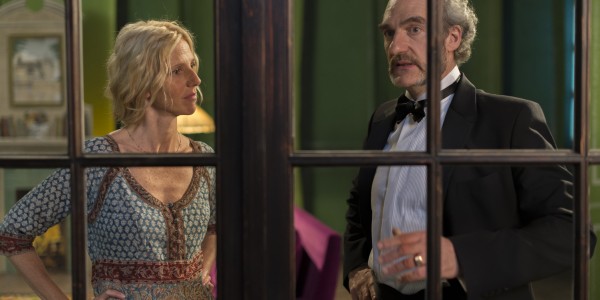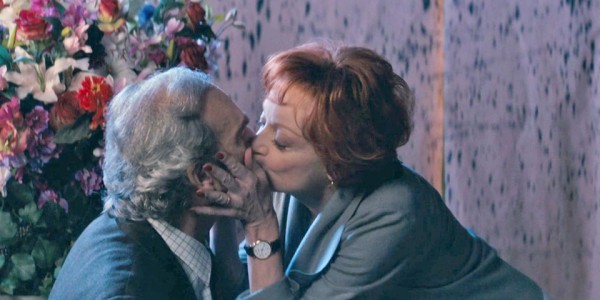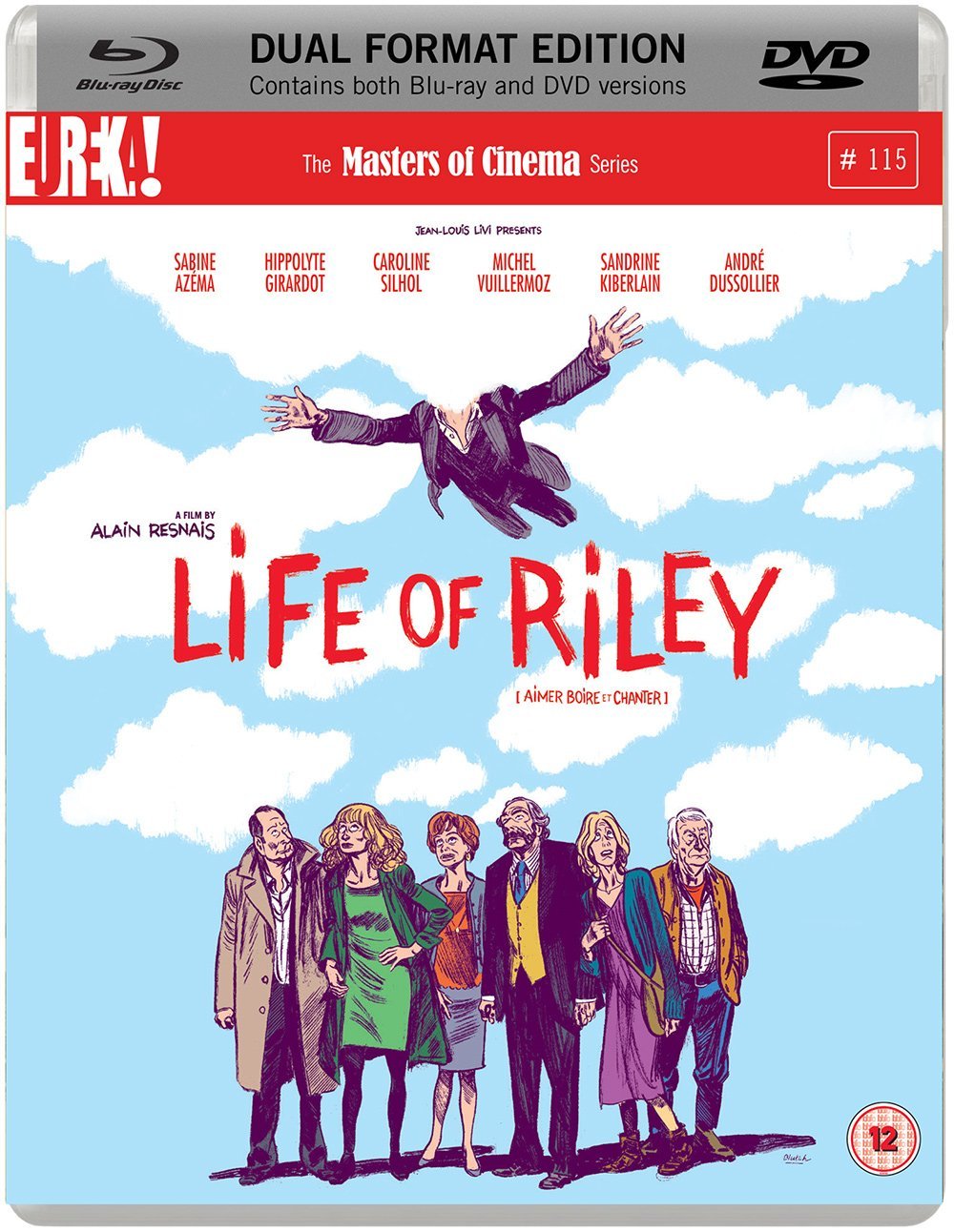Masters of Cinema Blu-ray Review: Life of Riley
"Au revoir Alain"
The Blu-ray of
Life of Riley is being released through Eureka's Masters of Cinema series; a label that the film's director Alain Resnais (
Hiroshima Mon Amour, Last Year in Marienbad) has thoroughly earned. 'Riley' marks the final directorial effort for the illustrious auteur who made his name during the French New Wave. He died on 1 March 2014 at the age of 92, mere weeks after the world premiere at the Berlin Film Festival. His final shot is fittingly occupied by a coffin.
Life of Riley is not however a downbeat examination of mortality. This is a breezy, slightly melancholic celebration of life, death, cinema, and theater, which lives up to its French title
Aimer, boire et chanter (Loving, drinking and singing).

After
Smoking/No Smoking and
Private Fears in Public Places, Resnais once again adapts a work by the British playwright Alan Ayckbourn. The story begins with tragic news: George Riley is diagnosed with a terminal illness and given six months to live. This piece of information has huge repercussions on three couples within his social circle. The title character remains offscreen for the entire film, but his fateful condition gradually earns him the affection of three women. Kathryn (Sabine Azéma), Tamara (Caroline Sihol) and George's ex-wife Monica (Sandrine Kiberlain) all begin to surround and pamper the patient, much to the chagrin of their husbands.
Stylistically, Resnais relies heavily on alienation devices, preventing the audience to identify with the characters. Even Bertholt Brecht, the German playwright who coined the phrase, would surely be impressed by the number of distancing elements on display here. The decision to retain the source material's Yorkshire setting and film in French is the first step. The set design is stripped down and theatrical, being one step above Lars von Trier's chalk-line approach of
Dogville and
Manderlay. The histrionics also influence the performance styles. The actors rely on melodramatic exclamations and big gestures, walking a fine line between the sublime and the ridiculous. Michel Vuillermoz's overly dramatic antics are a particular joy to watch. To make matters even more complicated, there is a play within the film, and the characters transition at times seamlessly between rehearsals and their private conversations. The different scenes are furthermore linked through exterior shots of the Yorkshire landscape as well as brief cartoons. Resnais occasionally frames the actors' close-up in front of a colorful, obviously fake background.

The purpose of an alienation effect is to make us think. Brecht wanted his audience to reflect on the socio-political meaning of his fiction, but Resnais is interested in the nature of art and the different forms of representation. His mise-en-scène borrows heavily from the theater, but
Life of Riley is rarely stagy or static. The director makes sure to give us what a play can not: close-ups and camera movements. He playfully experiments with the possibilities and ramifications of the two artforms, creating a deliberately simple hybrid. Through the alienation effects, Resnais invites the audience to become part of this process.
The story meanwhile remains accessible and believable in the midst of these broader reflections. There is nothing original or brilliant in the narrative, but we grow to care for the characters and their middle-class plights. French-speakers will enjoy the smart, free-flowing dialogue, while others will find pleasure in the absurdity of the situation.
Life of Riley may not be a masterpiece, but it clearly is the work of a master. Love, drink, sing, watch it.
 Special Features:
Special Features: The Blu-ray arrives with the original trailer for the film as well as a series of brief interviews in which the cast members express their admiration for Resnais. The main attraction are an exclusive 15-minute discussion about the director's late films with critic and scholar Geoffrey O'Brien and a 36-page booklet featuring an essay by Cristina Álvarez López and a note by playwright Alan Ayckbourn.
Pros
- Its reflections on the nature of cinema and theatre
- The sense of optimism and playfulness
- A swansong for one of cinema's true greats
Cons
- Alienation overdose
- Some of the humor might be lost in translation
 After Smoking/No Smoking and Private Fears in Public Places, Resnais once again adapts a work by the British playwright Alan Ayckbourn. The story begins with tragic news: George Riley is diagnosed with a terminal illness and given six months to live. This piece of information has huge repercussions on three couples within his social circle. The title character remains offscreen for the entire film, but his fateful condition gradually earns him the affection of three women. Kathryn (Sabine Azéma), Tamara (Caroline Sihol) and George's ex-wife Monica (Sandrine Kiberlain) all begin to surround and pamper the patient, much to the chagrin of their husbands.
Stylistically, Resnais relies heavily on alienation devices, preventing the audience to identify with the characters. Even Bertholt Brecht, the German playwright who coined the phrase, would surely be impressed by the number of distancing elements on display here. The decision to retain the source material's Yorkshire setting and film in French is the first step. The set design is stripped down and theatrical, being one step above Lars von Trier's chalk-line approach of Dogville and Manderlay. The histrionics also influence the performance styles. The actors rely on melodramatic exclamations and big gestures, walking a fine line between the sublime and the ridiculous. Michel Vuillermoz's overly dramatic antics are a particular joy to watch. To make matters even more complicated, there is a play within the film, and the characters transition at times seamlessly between rehearsals and their private conversations. The different scenes are furthermore linked through exterior shots of the Yorkshire landscape as well as brief cartoons. Resnais occasionally frames the actors' close-up in front of a colorful, obviously fake background.
After Smoking/No Smoking and Private Fears in Public Places, Resnais once again adapts a work by the British playwright Alan Ayckbourn. The story begins with tragic news: George Riley is diagnosed with a terminal illness and given six months to live. This piece of information has huge repercussions on three couples within his social circle. The title character remains offscreen for the entire film, but his fateful condition gradually earns him the affection of three women. Kathryn (Sabine Azéma), Tamara (Caroline Sihol) and George's ex-wife Monica (Sandrine Kiberlain) all begin to surround and pamper the patient, much to the chagrin of their husbands.
Stylistically, Resnais relies heavily on alienation devices, preventing the audience to identify with the characters. Even Bertholt Brecht, the German playwright who coined the phrase, would surely be impressed by the number of distancing elements on display here. The decision to retain the source material's Yorkshire setting and film in French is the first step. The set design is stripped down and theatrical, being one step above Lars von Trier's chalk-line approach of Dogville and Manderlay. The histrionics also influence the performance styles. The actors rely on melodramatic exclamations and big gestures, walking a fine line between the sublime and the ridiculous. Michel Vuillermoz's overly dramatic antics are a particular joy to watch. To make matters even more complicated, there is a play within the film, and the characters transition at times seamlessly between rehearsals and their private conversations. The different scenes are furthermore linked through exterior shots of the Yorkshire landscape as well as brief cartoons. Resnais occasionally frames the actors' close-up in front of a colorful, obviously fake background.
 The purpose of an alienation effect is to make us think. Brecht wanted his audience to reflect on the socio-political meaning of his fiction, but Resnais is interested in the nature of art and the different forms of representation. His mise-en-scène borrows heavily from the theater, but Life of Riley is rarely stagy or static. The director makes sure to give us what a play can not: close-ups and camera movements. He playfully experiments with the possibilities and ramifications of the two artforms, creating a deliberately simple hybrid. Through the alienation effects, Resnais invites the audience to become part of this process.
The story meanwhile remains accessible and believable in the midst of these broader reflections. There is nothing original or brilliant in the narrative, but we grow to care for the characters and their middle-class plights. French-speakers will enjoy the smart, free-flowing dialogue, while others will find pleasure in the absurdity of the situation. Life of Riley may not be a masterpiece, but it clearly is the work of a master. Love, drink, sing, watch it.
The purpose of an alienation effect is to make us think. Brecht wanted his audience to reflect on the socio-political meaning of his fiction, but Resnais is interested in the nature of art and the different forms of representation. His mise-en-scène borrows heavily from the theater, but Life of Riley is rarely stagy or static. The director makes sure to give us what a play can not: close-ups and camera movements. He playfully experiments with the possibilities and ramifications of the two artforms, creating a deliberately simple hybrid. Through the alienation effects, Resnais invites the audience to become part of this process.
The story meanwhile remains accessible and believable in the midst of these broader reflections. There is nothing original or brilliant in the narrative, but we grow to care for the characters and their middle-class plights. French-speakers will enjoy the smart, free-flowing dialogue, while others will find pleasure in the absurdity of the situation. Life of Riley may not be a masterpiece, but it clearly is the work of a master. Love, drink, sing, watch it.
 Special Features: The Blu-ray arrives with the original trailer for the film as well as a series of brief interviews in which the cast members express their admiration for Resnais. The main attraction are an exclusive 15-minute discussion about the director's late films with critic and scholar Geoffrey O'Brien and a 36-page booklet featuring an essay by Cristina Álvarez López and a note by playwright Alan Ayckbourn.
Special Features: The Blu-ray arrives with the original trailer for the film as well as a series of brief interviews in which the cast members express their admiration for Resnais. The main attraction are an exclusive 15-minute discussion about the director's late films with critic and scholar Geoffrey O'Brien and a 36-page booklet featuring an essay by Cristina Álvarez López and a note by playwright Alan Ayckbourn.